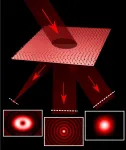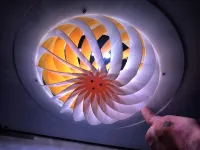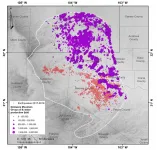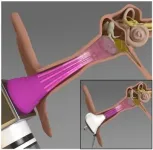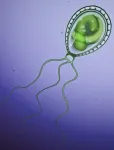Study: Hundreds of lives saved in Kansas counties that adopted mask mandates
2021-06-28
(Press-News.org) LAWRENCE -- Despite facing cultural and political pushback, the evidence remains clear: Face masks made a difference in Kansas.
"These had a huge effect in counties that had a mask mandate," said Donna Ginther, the Roy A. Roberts Distinguished Professor of Economics and director of the Institute for Policy & Social Research at the University of Kansas. "Our research found that masks reduced cases, hospitalizations and deaths in counties that adopted them by around 60% across the board."
Ginther's article "Association of Mask Mandates and COVID-19 Case Rates, Hospitalizations and Deaths in Kansas" examines the effect of masks on the state's 105 counties. It appears in JAMA Network Open, a journal published by the American Medical Association.
Kansas boasts the fifth-highest total of counties among all the states. Executive Order No. 20-52 that took effect in July of 2020 was initially adopted by only 15 counties, with 68 others not adopting the order through October. A second mandate in November was embraced by an additional 40 counties.
"We thought masks would matter for certain cases, but the effect size for hospitalizations and deaths being the same rate was pretty astonishing," Ginther said.
Co-written with Carlos Zambrana, an associate researcher at the Institute for Policy & Social Research, Ginther estimated masks saved about 500 lives in adoptive counties. And, yet, other counties often refused to adopt the mandate, citing personal freedoms and lack of scientific evidence as reasons.
"There's no way to run a clinical trial on masks because you'd have to observe people using them all the time, and we can't observe everyone's behavior. This type of observational study is the best we can do," Ginther said.
"But in terms of personal freedom, I would say that wearing a mask is a public good. There's a negative externality to not wearing one, and you could get infected or infect others. In a pandemic, where close to 600,000 people have died, this is a low-cost preventative measure that preserves life."
Data for her study was corralled from several sources. She used the daily total number of cases per county from The New York Times COVID-19 data in the U.S. GitHub repository. The state information came from the list of county official actions compiled by the Kansas Health Institute. Linear regression difference-in-difference models were then employed, with cases regressed on an indicator variable that started 21 days after the mandate to allow for changes in mask-wearing behavior, an indicator for no coronavirus cases and the number of days since the first recorded case.
"We are required to wear seatbelts in the state to save lives. We get driver's licenses to save lives. We have vaccine mandates for children going to school to prevent the spread of infectious disease. These are all public health measures that we follow. At some point, the government steps in and says, 'These are the right things to do to save lives,'" she said.
Aside from the health implications of ignoring a mask mandate, there are also economic ones.
"COVID-19 costs money," she said. "It slows down economic activity. It drains money for hospitalizations. We show that if you prevent COVID, you save the health care system money."
Now in her 18th year at KU, Ginther believes "Association of Mask Mandates" demonstrates the importance of nonmedical interventions for preventing the spread of respiratory diseases.
She said, "Given everything that's happening around the world, this may not be the last pandemic in our lifetime. Just think about places like India that don't have access to the vaccine. If you're wanting to slow the spread, knowing that a mask works and is a cost-effective approach to public health is really important."
INFORMATION:
[Attachments] See images for this press release:

ELSE PRESS RELEASES FROM THIS DATE:
2021-06-28
Washington, DC--Location, location, location--when it comes to the placement of wind turbines, the old real estate adage applies, according to new research published in Proceedings of the National Academy of Sciences by Carnegie's Enrico Antonini and Ken Caldeira.
Turbines convert the wind's kinetic energy into electrical energy as they turn. However, the very act of installing turbines affects our ability to harness the wind's power. As a turbine engages with the wind, it affects it. One turbine's extraction of energy from the wind influences the ability of its neighbors to do the same.
"Wind is never going to 'run dry' as an energy resource, but our ability to harvest it isn't infinitely scalable either," Antonini explained. "When wind turbines ...
2021-06-28
The ability to precisely control the various properties of laser light is critical to much of the technology that we use today, from commercial virtual reality (VR) headsets to microscopic imaging for biomedical research. Many of today's laser systems rely on separate, rotating components to control the wavelength, shape and power of a laser beam, making these devices bulky and difficult to maintain.
Now, researchers at the Harvard John A. Paulson School of Engineering and Applied Sciences have developed a single metasurface that can effectively tune the different properties of laser light, ...
2021-06-28
In the context of recent debate over the FDA's approval of aducanumab, it's refreshing to learn about a model of Alzheimer's neurodegeneration that doesn't start with the pathogenic proteins amyloid or Tau.
A new paper in Alzheimer's & Dementia from Emory neuroscientist Shan Ping Yu and colleagues focuses on an unusual member of the family of NMDA receptors, signaling molecules that are critical for learning and memory. Their findings contain leads for additional research on Alzheimer's, including drugs that are already FDA-approved that could be used preventively, and genes ...
2021-06-28
Deployable structures -- objects that transition from a compact state to an expanded one -- are used everywhere from backyards to Mars. But as anyone who has ever struggled to open an uncooperative folding chair knows, transforming two-dimensional forms into three-dimensional structures is sometimes a challenge.
Now, researchers from the Harvard John A. Paulson School of Engineering and Applied Sciences (SEAS) and the Harvard Graduate School of Design have developed a deployable system that is light, compact, inexpensive, easy to manufacture, and, most importantly, easy to deploy. By harnessing the mechanical instabilities in curved beams, the system can transform objects into elaborate and customizable 3D configurations on a range of scales, from large-scale furniture to small medical ...
2021-06-28
Boulder, Colo., USA: Subsurface carbon sequestration--storing carbon in
rocks deep underground--offers a partial solution for removing carbon from
the atmosphere. Used alongside emissions reductions, geologic carbon
sequestration could help mitigate anthropogenic climate change. But like
other underground operations, it comes with risks--including earthquakes.
Geophysicists are still working to understand what can trigger
human-induced earthquakes, which have been documented since the 1960s. A
new study, published in Geology on Thursday, explores why part of
a heavily produced oilfield in the U.S. has ...
2021-06-28
Middle ear infections, also known as otitis media, affect more than 80% of the children in the U.S. In a new study, researchers have designed a miniaturized 3D-printed device to inactivate Pseudomonas aeruginosa, a common bacterium that causes the infection.
The device--a microplasma jet array--generates plasma, which is composed of charged particles and reactive molecules that have been previously shown to inactivate various pathogens. "This is the first time anyone has tried treating middle ear infections using plasma technology," said Jungeun Won, a graduate student in the Boppart lab. "Usually, the treatment involves using ...
2021-06-28
HUNTINGTON, W.Va. - According to researchers at Marshall University, a maternal diet rich in Omega-3 fatty acids protects from breast cancer development in offspring. In a new study recently published by Frontiers in Cell and Developmental Biology, researchers noted a significant difference in mice from mothers that were fed a diet rich in canola oil, compared with mothers fed a diet rich in corn oil. A maternal Omega 3-rich diet affected genome-wide epigenetic landscape changes in offspring and potentially modulated gene expression patterns.
Dr. Ata Abbas, a former postdoctoral research fellow in Marshall's Department of Biological Sciences, headed a research team under the leadership ...
2021-06-28
New Brunswick, N.J. (June 28, 2021) - A Rutgers-led study sheds new light on the evolution of photosynthesis in plants and algae, which could help to improve crop production.
The paper appears in the journal New Phytologist.
The scientists reviewed research on the photosynthetic amoeba Paulinella, which is a model to explore a fundamental question about eukaryote evolution: why was there a single origin of algae and plants? That is, why did photosynthesis by primary plastid endosymbiosis not originate multiple times in the tree of life?
Photosynthesis is the process by which plants and other organisms use sunlight to synthesize ...
2021-06-28
A first-of-its-kind longitudinal study of infant curiosity found that months-old babies most captivated by magic tricks became the most curious toddlers, suggesting a pre-verbal baby's level of interest in surprising aspects of the world remains constant over time and could predict their future cognitive ability.
"Something about a baby's curiosity about magic tricks is predicting how curious they become as preschoolers," said Lisa Feigenson, co-director of the Johns Hopkins University Laboratory for Child Development. "What the data suggest is that some three-year-olds have a leg up or seem particularly well positioned to learn a lot about the world."
The findings appear today in Proceedings of the National Academy of Sciences.
Until this study, little was known about curiosity ...
2021-06-28
New Brunswick, N.J. (June 28, 2021) - COVID-19's socio-economic effects will likely cause another severe production crisis in the coffee industry, according to a Rutgers University-led study.
The study, which appears in the journal Proceedings of the National Academy of Sciences, included researchers from the University of Arizona, University of Hawaii at Hilo, CIRAD, Santa Clara University, Purdue University West Lafayette and University of Exeter.
"Any major impacts in the global coffee industry will have serious implications for millions of people across the globe, including the coffee retail ...
LAST 30 PRESS RELEASES:
[Press-News.org] Study: Hundreds of lives saved in Kansas counties that adopted mask mandates

